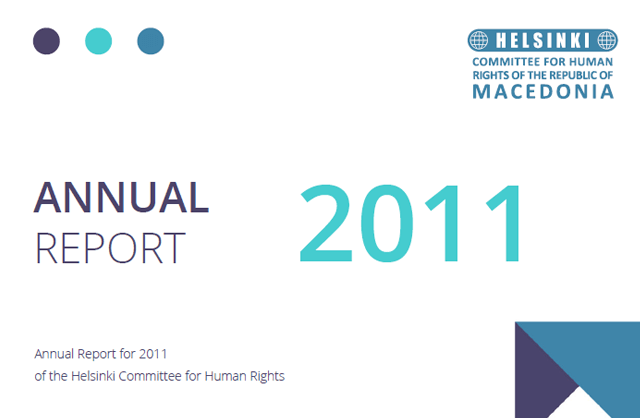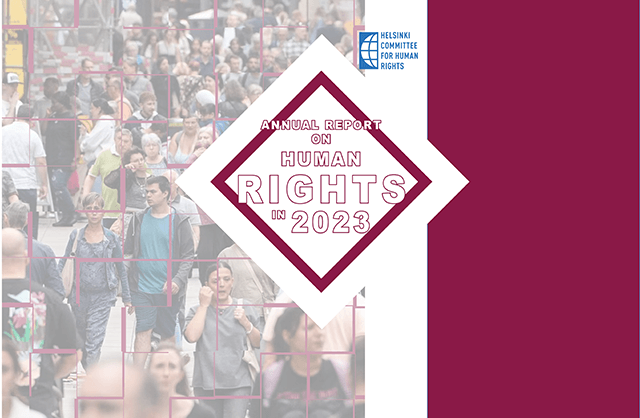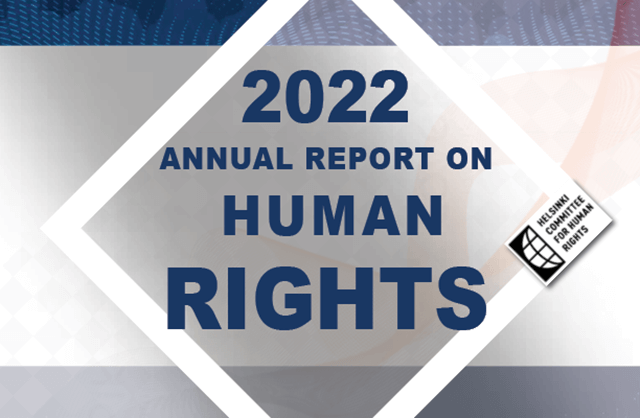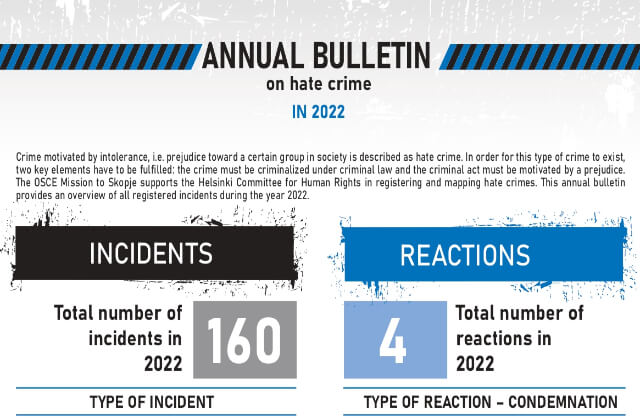Annual report on human rights in 2011
May 14, 2012

The Annual Report for 2011 summarizes the work of the Committee throughout the year, and explains the state of the human rights and freedoms in the Republic of Macedonia. These conditions were actively monitored by the Helsinki Committee and were reported in the regular monthly reports. Based on the above mentioned, the overall estimate is that in 2011 there were serious violations to the basic civil and political rights. These were not isolated incidents, but on the contrary; they are an indicator of systemic problems existing in the area of protection of human rights and the rule of law in the Republic of Macedonia.This report is an assessment and an analysis of the causes and conditions in the following areas: Judiciary, Police, Lustration process, Protection and treatment of citizens, especially to marginalised groups in the society , Freedom of media and freedom of expression, Penitentiary institutions, Economic and social justice.
There are clear indications that the judiciary is still under permanent influence by the executive power and powerful political figures. The key points of interference are selection, dismissal and transfer of judges. The Judicial Council and the Council of Public Prosecutors are still used as a tool by the politicians to exercise explicit or implicit pressure on the judiciary. This creates a general climate of uncertainty and threat among judges and public prosecutors, as well as influence them in reaching verdicts and decisions. The continuation of the trend of politically motivated criminal charges is highly worrying. The Helsinki Committee is particularly concerned for the delay in implementation of guarantees for the rights of suspects in police and court proceedings, according to international standards. The Committee reacts continuously to this ill-fitted practice of the courts regarding the measure of (pre-trial) detention. This measure was proclaimed and extended with unsubstantiated explanations for it; soft measures were not applied when possible, and mainly this has been used as punishment.
The Public Prosecutor’s Office failed to annul its close relationship with the MoI and show that everyone is equally accountable before the law, even when it comes to cases where police officials are involved. The case of Martin Neskovski showed that the prosecution has no effective control and cannot initiate criminal investigations against alleged police abuses; and they have no clear guidelines and procedures for conducting such investigations.
There is still no system for efficient and constant external supervision over the use of special investigative measures, which would ensure that these measures are indeed applied only by a court order and in a legal manner with no arbitrariness and abuse. When it comes to the area of defence and security, in the Republic Macedonia, in the past period, two significant negative trends are observed: Absence of a systematic law for completion of the normative legal framework to regulate the functioning of the security sector institutions, ruled by the principle of rule of law, and absence of lex specialis for democratic and civil control over security sector.
The lustration continues to take place, going directly against the decisions of the Constitutional Court, and it becomes an instrument for violation of human rights. The Helsinki Committee is quite vocal in its warnings about the gravity of human rights violations and problems with regards to the principle of constitutionality and legality created with the current lustration process in the Republic of Macedonia.
The first year of implementation of the Law on Prevention and Protection from Discrimination indicated all of the shortcomings of this Law, which were noted by the civil society in the process of its adoption. Its weak applicability increases discrimination, and with it, the intolerance between different groups and individuals, leading to increased tensions in the society. In the course of 2011, political affiliation was one of the leading grounds on which discrimination took place, especially in public administration. The trend of worsening gender equality was also visible in 2011. Strong patriarchal subliminal messages are received every day, from various sources. It is particularly worrying that these messages come from state institutions, which is contrast to the declarative commitment to gender equality. Insufficient political, media and cultural representation of communities, comprising less than 20% of the population, is an indicator of a closed and discriminatory society, accepting no diversity. Roma people, despite the activities from the Roma Decade, are still one of the most marginalized communities in the Republic of Macedonia. Furthermore, LGBTI community is still one of the most vulnerable communities in our society, subject to manipulation and discrimination.
In 2011, the Committee registered major fall-back in protection and promotion on freedom of expression and the freedom of the media. Namely, the first independent TV station A1, on 30.07.2011, stopped broadcasting its programme, after 18 years of existence. Within the framework of freedom of information, the Helsinki Committee opposes the proposals for changes to media legislation and regulating the media market in the country. This was also met with strong reactions by the general and expert audience, as well by international media.
This past year, the trend of escalation of hate speech in the media was recorded. Hate speech was, in most part, directed those who publicly criticized the government and the ruling party. Dozens of intellectuals were exposed to hate speech, mainly promoted by media and journalists with public pro-government loyalty.
Accommodation conditions in penitentiary institutions (prisons and detention centres) are below the minimum required standards according to international and domestic legislation. The Ministry of Internal Affairs and Ministry of Justice continue to refuse CSOs to conduct monitoring on police stations and prisons. This would improve the conditions and procedures that guarantee protection of the minimum standards of persons deprived of their freedom as a particularly vulnerable group.
The Helsinki Committee for Human Rights of the Republic of Macedonia in its annual report notes several categories of violations of human rights and freedoms in the economic and social rights, and they are as follows: Rights of employees (labor relations and protection at work); Health Insurance Law; Right to education; Rights of the child and domestic violence (Common Protocol in cases of domestic violence).


